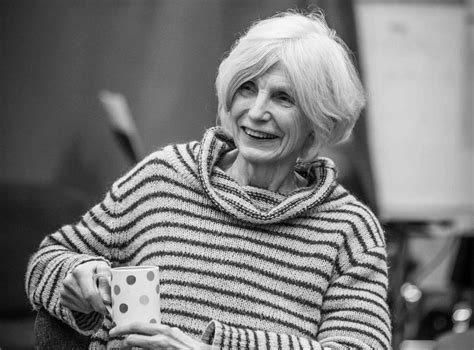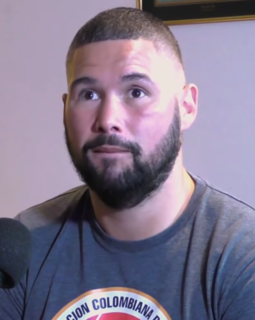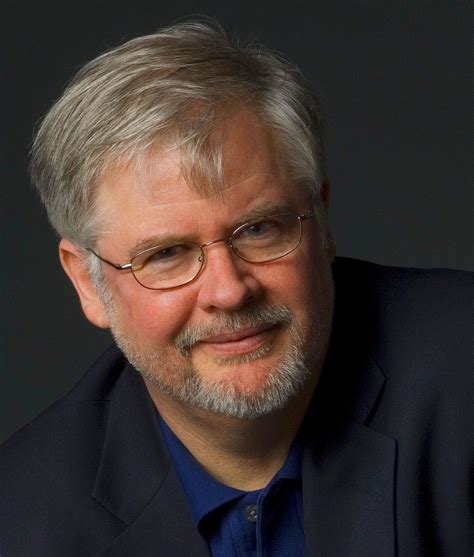Ein Zitat von Caryl Churchill
Darin ist nichts Persönliches [THE SKRIKER]. Ich bin bei keinem der Stücke jemals geneigt zu sagen: Darum geht es, denn in den Stücken geht es um das gesamte Ereignis, das sie darstellen. . . . Ich wollte auf jeden Fall ein Stück über Schäden schreiben – Schäden an der Natur und Schäden an Menschen, von denen es beides reichlich gibt. Insofern war ich gerade dabei, ein Theaterstück über England zu schreiben.
Verwandte Zitate
Daran muss ich arbeiten: das wirklich Wichtige zu trennen, Energie zu sparen, indem ich mir keine Gedanken darüber mache, was andere Leute denken. Wenn ich durch diese Tür gehe, geht es um mein Zuhause. Wenn ich das nicht täte, würde ich mich nur noch von einer Sache verzehren und den Menschen schaden, die mich lieben. Und es würde der Arbeit schaden.
Auf jeden Fall habe ich in meinen Texten das Gefühl, dass die Leute mich jetzt auf eine persönliche Art und Weise kennen. Und das stimmt bis zu einem gewissen Grad, weil ich über sehr persönliche Dinge schreibe und das Persönliche oft verwende, um einige dieser gesellschaftspolitischen Themen, mit denen wir uns beschäftigen, in einen Kontext zu setzen. Und bis zu einem gewissen Grad haben sie recht. Sie wissen etwas über mich.
Wenn man sich den Schaden ansieht, den viele der von Donald Trump vorgeschlagenen Maßnahmen unseren Bürgern der USA zufügen können, kann man ihn mit den großen Stürmen Harvey, Irma und Maria vergleichen. Wir reden über Fragen von Leben und Tod und über die Aufhebung des Affordable Care Act. Es stehen Leben auf dem Spiel. Etwas, das Millionen und Abermillionen Menschen betreffen würde. Ich denke, es ist völlig angemessen. Offensichtlich ist es eine Metapher. Es ist nicht wörtlich zu nehmen. Aber ich meine, wenn ich über den Schaden und das Trauma spreche, die durch seine Präsidentschaft in unser Leben gebracht wurden, dann ist das sehr real.
Die moderne Zivilisation widmet sich größtenteils dem Kult der Täuschung. Es gibt keine allgemeinen Informationen über die Natur des Geistes. Es wird kaum von Schriftstellern oder Intellektuellen darüber geschrieben; moderne Philosophen sprechen nicht direkt darüber; Die Mehrheit der Wissenschaftler bestreitet, dass es überhaupt existieren könnte. In der Populärkultur spielt es keine Rolle: Niemand singt darüber, niemand spricht in Theaterstücken darüber und es kommt nicht im Fernsehen. Wir werden tatsächlich zu dem Glauben erzogen, dass nichts realer ist als das, was wir mit unseren gewöhnlichen Sinnen wahrnehmen können.
Ich bin ein tiefgreifender Pessimist, sowohl was das Leben als auch die menschlichen Beziehungen sowie Politik und Ökologie betrifft. Menschen sind unzulängliche und dumme Wesen, die früher oder später ein Chaos anrichten, und diejenigen, die versuchen, Gutes zu tun, richten viel mehr Schaden an als diejenigen, die sich durcheinander wurstteln.
Als Schauspieler muss ich meine Haare föhnen, färben und alle möglichen Produkte verwenden. Das beste „Pantene Total Damage Care“-Sortiment kümmert sich um den Schaden von innen heraus. Sowohl das Shampoo als auch die Spülung waren für mich lebensrettend und haben meine Haare vor all den Schäden bewahrt, die sie durch das tägliche Styling erleiden.
Ich finde es sehr seltsam, wenn Leute sagen, dass sie versuchen, „Onkel Wanja“ zu lösen oder eine Lösung für „Heinrich V.“ zu finden. Theaterstücke sind keine Rätsel. Es geht ihnen ums Spielen. Aber im Theater geht es mittlerweile so sehr ums Aufführen und Schauspielen statt ums Spielen, was sehr schade ist, weil das Publikum davon fasziniert ist, Menschen beim Spielen zuzuschauen.
So etwas wie ein Fehlschuss, und beim nächsten Spielzug denkst du darüber nach, oder du gibst einen Spielzug in der Verteidigung auf und denkst darüber nach, du bist frustriert darüber, das, was passiert, ist das, worüber du wirklich nachdenkst du selbst. Du bist nicht mit dem Team verbunden. Und man muss verbunden sein, sonst summieren sich die paar Spiele.
Ich bin froh, dass du es warst und nicht ich“, sagte Shane und reichte Myrin die Hand. „Irgendeine Hirnschädigung?“ „Da die Kugel tatsächlich durch sein Gehirn gegangen ist, liegt dann, ja, Idiot, ganz sicher eine Hirnschädigung vor“, sagte Oliver. „Es wird vergehen. Sein Gehirn ist das am wenigsten Zerbrechliche an ihm.“ „Du sagst die nettesten Dinge“, sagte Myrin. Er sprach undeutlich und warf einen Arm um Olivers Hals. „Heirate mich.
Schreiben hat nichts mit Veröffentlichen zu tun. Nichts. Die Leute sind darüber völlig verwirrt. Du schreibst, weil du musst – du schreibst, weil du nicht nicht schreiben kannst. Der Rest ist Showbusiness. Das kann ich nicht stark genug sagen. Schreiben Sie einfach – kümmern Sie sich später um den Rest, wenn Sie sich überhaupt Sorgen machen. Was zählt, ist, was mit Ihnen passiert, während Sie die Geschichte, das Gedicht, das Stück schreiben. Der Rest ist Showbusiness.
Wir müssen klarer über Sexualität, Empfängnisverhütung, Abtreibung und Werte sprechen, die die Bevölkerung kontrollieren, denn die ökologische Krise ist kurz gesagt die Bevölkerungskrise. Reduziert man die Bevölkerung um 90 %, bleiben nicht mehr genug Menschen übrig, um einen großen ökologischen Schaden anzurichten.





































